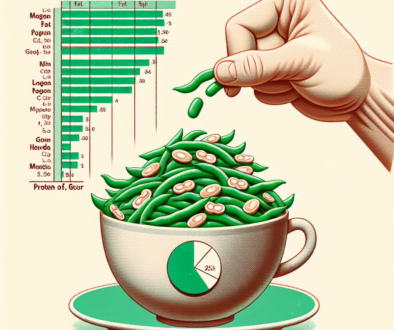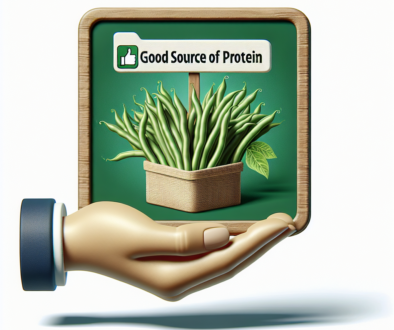Do Beans Have Protein Like Meat?
-
Table of Contents
- Protein in Beans vs. Meat: A Comprehensive Comparison
- Understanding Protein in Our Diet
- Protein Content in Beans
- Protein Quality in Meat
- Comparing Protein: Beans vs. Meat
- Can Beans Replace Meat as a Protein Source?
- Health Implications of Choosing Beans Over Meat
- Case Studies and Statistics
- Conclusion: The Protein Potential of Beans
- Discover ETprotein’s High-Quality Plant Proteins
Protein in Beans vs. Meat: A Comprehensive Comparison

When it comes to protein sources, meat has traditionally been the go-to option for many. However, with a growing interest in plant-based diets and sustainable eating, beans have emerged as a powerful alternative. The question often arises: do beans provide protein comparable to that of meat? This article delves into the protein content of beans, how it measures up to meat, and the implications for those considering plant-based proteins.
Understanding Protein in Our Diet
Proteins are essential macronutrients made up of amino acids, which are the building blocks of our body’s tissues. They play a crucial role in muscle repair, enzyme production, and hormone regulation. Both animal and plant-based foods can be rich sources of protein, but they differ in amino acid composition and nutritional profiles.
Protein Content in Beans
Beans are a staple in many cultures and are known for their high protein content. Common varieties like black beans, kidney beans, and lentils offer about 15 grams of protein per cooked cup (approximately 240 ml). This makes them an excellent source of plant-based protein. Additionally, beans are rich in fiber, vitamins, and minerals, contributing to a well-rounded diet.
- Black beans: 15g of protein per cup
- Kidney beans: 13g of protein per cup
- Lentils: 18g of protein per cup
Protein Quality in Meat
Meat, including poultry, beef, and pork, is well-known for its high protein content. A 3-ounce (85 grams) serving of cooked chicken breast offers about 26 grams of protein, while the same amount of lean beef provides around 22 grams. Meat is a complete protein source, meaning it contains all nine essential amino acids that the body cannot produce on its own.
- Chicken breast: 26g of protein per 3 ounces
- Lean beef: 22g of protein per 3 ounces
Comparing Protein: Beans vs. Meat
While both beans and meat are high in protein, there are some differences to consider:
- Amino Acid Profile: Meat contains all essential amino acids, making it a complete protein. Beans, on the other hand, are typically low in one or more essential amino acids, such as methionine.
- Protein Density: Meat generally provides more protein per serving compared to beans. However, when considering the protein content per calorie, beans can be more protein-dense.
- Nutritional Benefits: Beans offer additional health benefits due to their high fiber content and lower saturated fat levels compared to meat.
- Environmental Impact: Producing plant-based proteins like beans typically requires less water and land and generates fewer greenhouse gases than raising livestock for meat.
Can Beans Replace Meat as a Protein Source?
For those looking to reduce meat consumption or follow a vegetarian or vegan diet, beans can serve as a viable protein source. By combining different plant proteins, such as beans with grains, one can obtain all essential amino acids. This concept is known as protein complementation.
- Rice and beans
- Lentils and barley
- Chickpeas and whole wheat bread
Health Implications of Choosing Beans Over Meat
Opting for beans as a primary protein source can have several health benefits:
- Reduced risk of chronic diseases such as heart disease, type 2 diabetes, and certain cancers
- Improved digestive health due to higher fiber content
- Potential weight management advantages because of the satiating effect of fiber and protein
Case Studies and Statistics
Research has shown that diets high in plant-based proteins can lead to better health outcomes. A study published in the American Journal of Epidemiology found that replacing red meat with plant-based proteins like beans was associated with a lower risk of mortality. Additionally, the Adventist Health Study-2 reported that vegetarians who consumed a variety of plant proteins had similar nutrient intakes to non-vegetarians.
Conclusion: The Protein Potential of Beans
In conclusion, beans do offer a protein content that can rival that of meat, especially when considering the full nutritional profile and health benefits. While meat provides a complete protein source, beans can be combined with other plant foods to create a complete amino acid profile. For those interested in plant-based diets, beans are an excellent and sustainable protein choice.
Discover ETprotein’s High-Quality Plant Proteins
If you’re looking to incorporate more plant-based proteins into your diet, ETprotein offers a range of high-quality protein products. Their selection includes organic rice protein, pea protein, and various seed proteins, all characterized by a neutral taste and non-GMO, allergen-free attributes. With L-(+)-Ergothioneine purity over 98%, ETprotein caters to diverse industries, including nutraceuticals and food and beverage. To explore their offerings and enhance your protein intake with plant-based options, contact ETprotein today.
About ETprotein:
ETprotein, a reputable protein and L-(+)-Ergothioneine (EGT) Chinese factory manufacturer and supplier, is renowned for producing, stocking, exporting, and delivering the highest quality organic bulk vegan proteins and L-(+)-Ergothioneine. They include Organic rice protein, clear rice protein, pea protein, clear pea protein, watermelon seed protein, pumpkin seed protein, sunflower seed protein, mung bean protein, peanut protein, and L-(+)-Ergothioneine EGT Pharmaceutical grade, L-(+)-Ergothioneine EGT food grade, L-(+)-Ergothioneine EGT cosmetic grade, L-(+)-Ergothioneine EGT reference grade and L-(+)-Ergothioneine EGT standard. Their offerings, characterized by a neutral taste, non-GMO, allergen-free attributes, with L-(+)-Ergothioneine purity over 98%, 99%, cater to a diverse range of industries. They serve nutraceutical, pharmaceutical, cosmeceutical, veterinary, as well as food and beverage finished product distributors, traders, and manufacturers across Europe, USA, Canada, Australia, Thailand, Japan, Korea, Brazil, and Chile, among others.
ETprotein specialization includes exporting and delivering tailor-made protein powder and finished nutritional supplements. Their extensive product range covers sectors like Food and Beverage, Sports Nutrition, Weight Management, Dietary Supplements, Health and Wellness Products, and Infant Formula, ensuring comprehensive solutions to meet all your protein needs.
As a trusted company by leading global food and beverage brands and Fortune 500 companies, ETprotein reinforces China’s reputation in the global arena. For more information or to sample their products, please contact them and email sales(at)ETprotein.com today.














